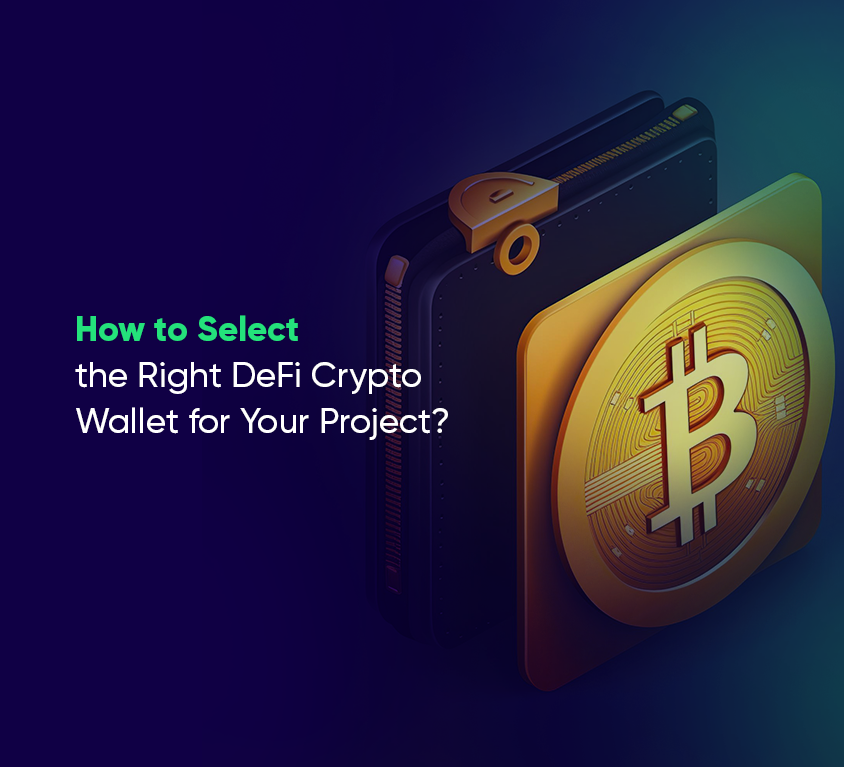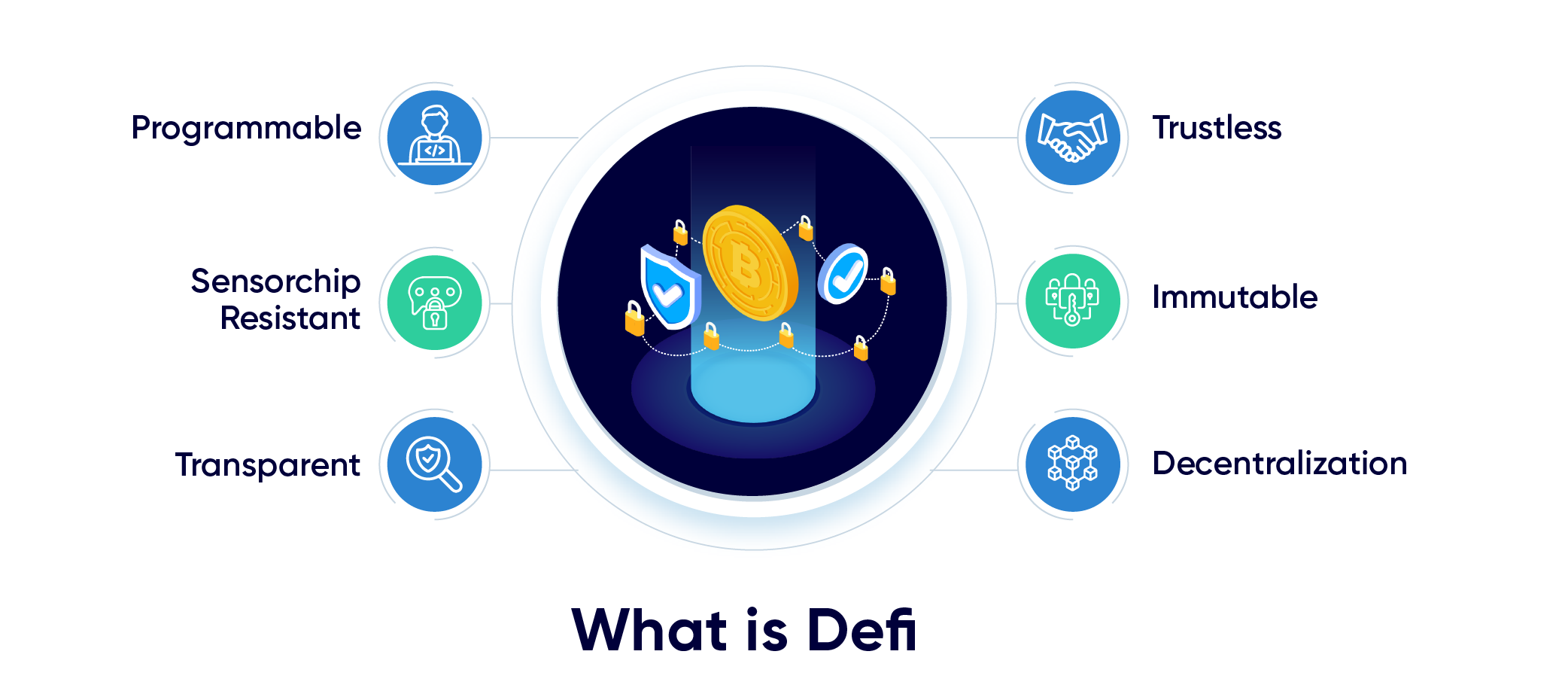
Introduction
Web3 & Blockchain Consultancy :
Top 5 DeFi Crypto Wallets in 2024: How to Choose?
The traditional financial system relied on banks and brokers to handle monetary transactions. Modern finance is decentralized and it empowers you to take control of your money. Now you can perform borrowing, lending, and trading directly with others with no middlemen involved. Sounds exciting, right? But to truly get the benefit of DeFi, you’ll need a key: a crypto DeFi wallet. This will work as a digital passport to connect you to decentralized applications (dApps), allowing you to explore a universe of financial possibilities – from lending and borrowing to seamless token swaps and beyond. However, with a growing number of DeFi wallet options available, choosing the right one can feel like navigating a financial jungle. This blog will help you understand what is the defi wallet in blockchain, the key features of DeFi wallets, their types, some safety tips, and how to select the perfect one to fuel your DeFi project.What is DeFi?
DeFi or Decentralized Finance is a set of financial applications and services built on blockchain technology. It operates on a decentralized network for secure, transparent, and trustless transactions. The idea of DeFi is to provide financial services to individuals regardless of location and status, bypassing traditional intermediaries and promoting financial inclusion.
What is a DeFi Wallet?
A Crypto DeFi wallet is a tool that works by digitally enabling the storage to send and receive decentralized tokens to interact with DeFi platforms. This wallet stores cryptographic keys, both private and public, which are used to verify ownership. DeFi wallets function by creating a private key and a public address which is generated from a seed phrase. DeFi transactions are authorized with a public key for receiving tokens and a private key for sending them.How Crypto DeFi Wallet Works?
Decentralized crypto wallets function by allowing users to connect with decentralized finance apps. It benefits users with full control over their funds within DeFi ecosystems. These wallets operate on self-custody principles. These principles allow users to maintain full ownership and control over their funds through public-key cryptography. Private key ensures that transactions are securely signed and only the user can authorize the movement of their assets. DeFi wallets are typically free to use, excluding network gas fees, making them an accessible and cost-effective solution for managing crypto assets. However, the security of a DeFi wallet depends on the user’s responsibility in safeguarding their seed phrase or private key. To prevent unauthorized access or loss of funds, it is crucial to backup and securely store the seed phrase offline in multiple locations.Crypto DeFi Wallet Types
There are different types of DeFi wallets, each type offers unique advantages and caters to different business needs and preferences. By understanding the characteristics and use cases of each wallet type, businesses can make informed decisions to optimize their DeFi strategies and secure their financial transactions effectively:1. Mobile Wallet
They operate on mobile devices and are available in downloadable apps from authorized service providers. Mobile wallets may be more susceptible to cyberattacks, so businesses with large investments or security priorities may need to consider additional measures.Mobile Wallet Features
- Mobile wallet apps provide easy access to DeFi platforms and functionalities on smartphones or tablets, making them ideal for businesses requiring on-the-go flexibility and real-time management.
- dApps are accessible to everyone, allowing businesses to reach a broader audience and encourage user engagement.
Example
Trust Wallet is a mobile wallet that supports various cryptocurrencies and DeFi tokens, offers full control over private keys, provides a secure interface for asset management, has a built-in dApp browser for decentralized applications, and allows direct token swaps.2. Web Wallet
Web wallets are accessible through web browsers without software download. It ensures the user’s private keys’ security through online storage. Accessible through web browsers, they are an ideal choice for businesses looking to provide DeFi solutions to customers or employees.Web Wallet Features
- They can be accessed from any internet-connected device.
- Promotes seamless collaboration and remote access.
- Their security relies heavily on the service provider, so businesses should prioritize providers with robust security measures and a proven track record.
Example
MetaMask is a popular DeFi browser or web wallet that offers seamless connectivity to decentralized applications, supports multiple blockchains, provides a user-friendly interface, and allows for the management of multiple wallets within a single browser extension.3. Hardware Wallet/Cold Wallet
Hardware wallet is also referred to as an offline wallet or cold wallet. It works using physical devices like USB drives for offline private key storage. It is an ideal choice for businesses holding large amounts of crypto or those prioritizing asset security.Hardware Wallet Features
- Provide exceptional security for crypto, as private keys are stored offline on a physical device like a USB drive, making them virtually immune to online hacking.
- Transactions can be initiated through the hardware wallet, adding an extra layer of protection.
- Offline storage comes at the cost of convenience, making it less suitable for frequent DeFi operations.
- Provides robust security features, virtually immune to hacking.
Example
Ledger and Trezor are popular brands for secure cryptocurrency storage. These physical wallets offer enhanced protection against cyber threats and can only trigger transactions via the physical device. These hardware wallets allow users to browse web3 while ensuring no one has access to their funds unless they have the physical hardware key.Crypto DeFi Wallet Security Consideration & Tips
Security of your digital assets is a priority when using DeFi wallets. You can significantly reduce the risk of losing your funds by following standard security practices. Here are some essential guidelines to ensure the safety of your DeFi wallet:- Safely store your seed phrase in multiple offline locations to protect your private key. Avoid digital storage or sharing it.
- Keep your operating system and applications updated to mitigate vulnerabilities. Be cautious when installing new software or browser extensions. Avoid using public or untrusted networks.
- Use De.Fi Scanner to conduct thorough due diligence and audit the contract’s code before interacting with any DeFi protocol or smart contract.
- Be cautious of phishing attempts and suspicious links. Double-check the website’s URL before entering your wallet information.
- Regularly review and revoke permissions granted to your DeFi wallet. Use tools like De.Fi Shield to manage and revoke permissions.
- Use hardware wallets like Ledger or Trezor for added security. Store your private keys offline and require physical confirmation to authorize transactions.
- Use De.Fi’s DeFi portfolio tracker to monitor your wallets and investments.
Top 5 Crypto DeFi Wallets 2024
The global decentralized finance market is set to soar, showcasing a 45.36% CAGR during 2024-2031. DeFi comes with the paramount importance of secure and efficient wallets. Here are the top 5 DeFi wallets that stand out:
Coinbase Wallet
Coinbase Wallet offers a user-friendly interface with robust security features, a self-custody solution with private key control, and an in-app dApp browser for seamless DeFi platform interaction.MetaMask Wallet
The web3 gateway is designed for DeFi enthusiasts, facilitating Ethereum and EVM-compatible blockchain transactions, with a built-in token swap function and seamless integration with DeFi platforms for staking.Ledger Nano S Plus
The hardware wallet provides cold storage, making it highly resistant to online threats, and offers enhanced storage capacity and faster transaction capabilities.Trezor Model One
This hardware wallet is a significant player in the hardware wallet category, offering support for various coins and tokens and seamless integration with popular DeFi platforms.How to Select the Right DeFi Crypto Wallet for Your Project?
Selecting a DeFi wallet type always depends on a user’s needs and requirements of the project. Here are some of the considerations that can be taken into account by a user or a business when selecting the right DeFi Cryptocurrency Wallet:
- Select non-custodial wallet: Verify that the wallet you have selected is non-custodial, which gives you complete authority over your money and private keys. The wallet should also have recovery seed and/or secure private key storage options.
- Compatibility and Interoperability: Make sure the wallet you choose is compatible with the blockchain network or chain you want to use. Integrating DeFi protocols and applications seamlessly requires compatibility and interoperability.
- Set up 2FA: For an extra degree of protection, always set up your wallet independently and give preference to wallets that support two-factor authentication (2FA).
- No Personal Information: An excellent DeFi wallet should place a high value on user privacy and avoid gathering pointless personal data. Retaining confidentiality and security depends on your ability to protect your privacy.
- Open-Source Code: Confirm that a transparent development team with a solid track record in supporting the wallet. Open-source software lowers the possibility of vulnerabilities or malicious activity by ensuring transparency and enabling community review.
- Should support other dApps: Seek out wallets with an easy-to-navigate and comprehend user interface. The wallet ought to facilitate an extensive array of decentralized applications (DApps) and protocols, guaranteeing smooth communication with the DeFi network.
- Observe Security: Adhere to the security precautions advised by the wallet provider and give preference to wallets with a strong security record. Make use of reputable and well-established wallets to reduce the possibility of financial losses and security breaches.